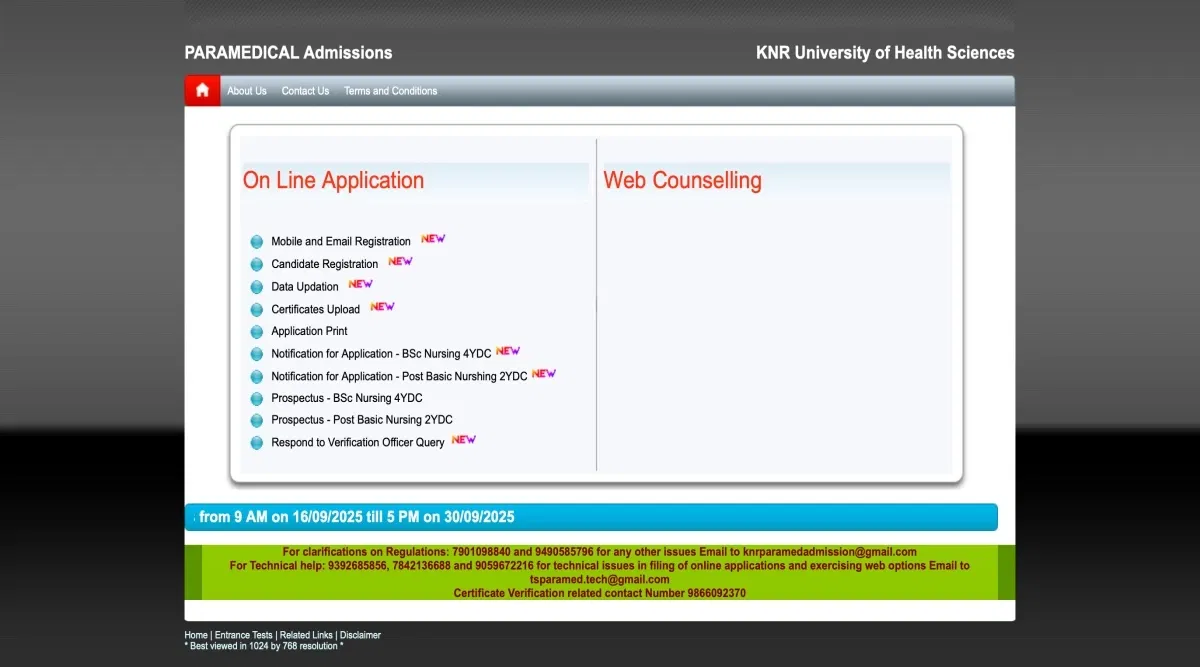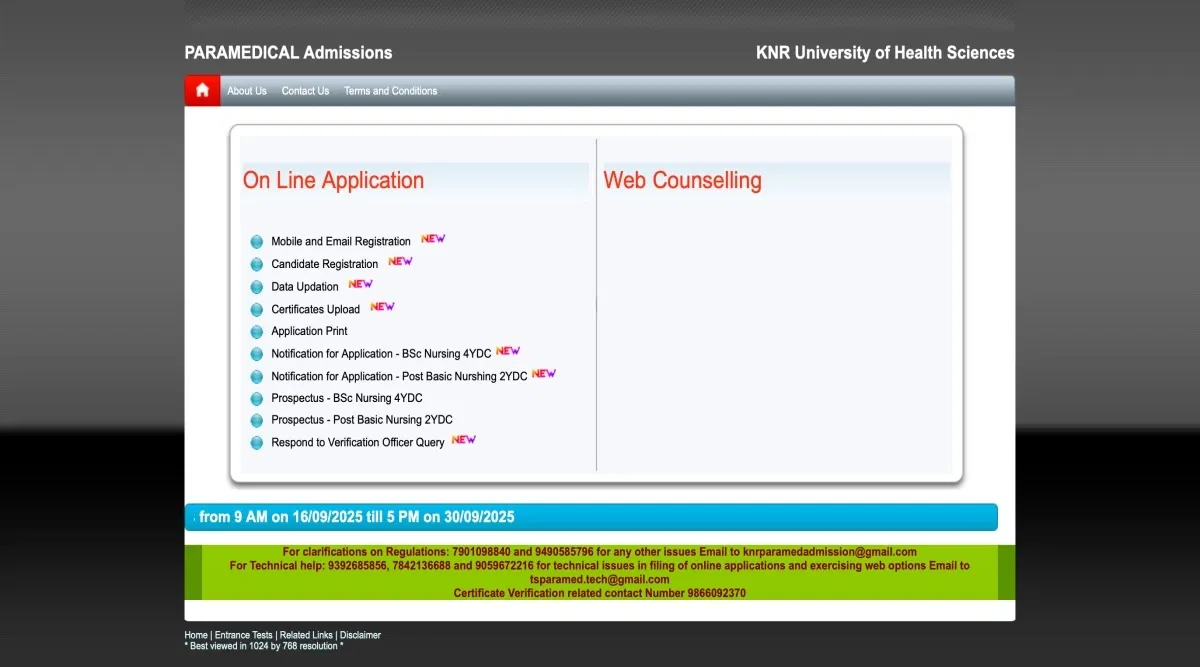BSc Nursing Syllabus and Subjects 2025 - Semester Wise, Electives, Books

BSc Nursing syllabus is divided into 8 semesters (4 years) that consist of core, elective and practical subjects to equip students with the skills and theoretical knowledge related to Nursing. The core BSc Nursing subjects include Anatomy, Physiology, Pharmacology, Pathology, Genetics, etc, and the elective subjects include Introduction to Computers, English Communication, Communication and Educational Technology, etc.
BSc Nursing course also enriches the students with practical subjects such as Medical-Surgical Nursing, Community Health Nursing, Microbiology, Nutrition, etc. The curriculum also includes clinical training, simulation training and an internship to enhance the students' practical skills and hands-on experience.
Check Detailed Year-Wise Syllabus:
| B.Sc Nursing 1st Year Syllabus | B.Sc Nursing 2nd Year Syllabus |
| B.Sc Nursing 3rd Year Syllabus | B.Sc Nursing 4th Year Syllabus |
Table of Contents
Semester-Wise B.Sc Nursing Syllabus 2025
B.Sc Nursing is a four-year course consisting of 8 semesters with a syllabus for each year set out differently; different zones and domains are provided in B.Sc Nursing. The syllabus and subjects pursued provide in-depth knowledge of the fundamentals of Genetics, Nutrition, Anatomy, and Physiology.
B.Sc Nursing Syllabus: Download Link
Candidates willing to pursue the B.Sc Nursing course must check its syllabus to get an idea about the subjects, coursework, and internship requirements on the university's official website. They can also download the B.Sc Nursing syllabus from the link given below.
| Particulars | Link |
| B.Sc Nursing Syllabus | Download Now |
B.Sc Nursing First Year Semester-Wise Syllabus 2025
The BSc in Nursing first-year syllabus focuses on subjects such as Anatomy, Psychology, and Nutrition to provide the students with a strong understanding of the course. The B.Sc Nursing subjects 1st year from the syllabus are detailed below:
| B.Sc Nursing Syllabus Semester I | |
| Anatomy | Biochemistry |
| Nursing Foundation I | Microbiology |
| English | - |
| B.Sc Nursing Semester II | |
| Physiology | Nutrition |
| Nursing Foundation II | Psychology |
| Introduction to Computers | - |
Practical Topics for BSc Nursing 2nd Year Syllabus
The practical topics for the BSc Nursing first and second semesters are listed below.
- Nutrition
- Microbiology
- Nursing Foundation I
- Nursing Foundation II
B.Sc Nursing Second Year Semester-Wise Syllabus 2025
BSc in Nursing second year syllabus covers subjects such as Pharmacology, Genetics, Pathology, etc. The B.Sc Nursing subjects in the second-year syllabus are detailed below:
| B.Sc Nursing Syllabus Semester III | |
| Sociology | Pathology |
| Psychotherapy | Medical-Surgical Nursing |
| B.Sc Nursing Syllabus Semester IV | |
| Pharmacology | Genetics |
| Communication and Educational Technology | Community Health Nursing I |
Practical Topics for BSc Nursing 2nd Year Syllabus
The practical topics for BSc Nursing 3rd and 4th semesters are given below.
- Medical-Surgical Nursing Practical
- Community Health Nursing I Practical
B.Sc Nursing Third Year Semester-Wise Syllabus 2025
BSc in Nursing third-year syllabus covers subjects such as Mental Health, Child Health, Research, etc. The B.Sc Nursing subjects from the third-year syllabus are detailed below:
| B.Sc Nursing Syllabus Semester V | |
| Medical Surgical Nursing II | Child Health Nursing |
| Library | - |
| B.Sc Nursing Syllabus Semester VI | |
| Nursing Research & Statistics | Mental Health Nursing |
| Self-Study | - |
Practical Topics for BSc Nursing 3rd Year Syllabus
Listed below are the practical topics for the BSc 5th and 6th semester syllabus:
- Medical Surgical Nursing II
- Child Health Nursing
- Mental Health Nursing
B.Sc Nursing Fourth Year Semester-Wise Syllabus 2025
BSc Nursing 4th year syllabus covers more practical and advanced topics such as Midwifery and Obstetrical Nursing, Community Health, etc. The B.Sc Nursing subjects from the fourth-year syllabus are detailed below:
| B.Sc Nursing Syllabus Semester VII | |
| Midwifery and Obstetrical Nursing | Community Health Nursing II |
| B.Sc Nursing Syllabus Semester VIII | |
| Management of Nursing Services and Education | Self-Study |
| Viva | - |
Practical Topics for BSc Nursing 4th Year Syllabus
The practical topics for the BSc Nursing 4th year syllabus are outlined below:
- Midwifery and Obstetric Nursing
- Community Health Nursing II
- Management of Nursing Services and Education
B.Sc Nursing Subjects
B.Sc Nursing Subjects are centred around introducing students to all the essential aspects of medicine and nursing. Listed below are the BSc Nursing subject details:
BSc Nursing Subject in Detail
The BSc Nursing subjects cover various aspects of nursing from basic to advanced topics related to anatomy, physiology, pharmacology, psychology, etc, to enable the student to be healthcare industry-ready. Listed below are some of the important BSc Nursing subjects and the topics covered:
| Year | Subjects | Topics Covered |
| 1st Year | Anatomy | Introduction to Anatomical terms organisation of the human body, Skeletal System, Muscular System, Nervous System, Sensory System, Respiratory System |
| Physiology | Cell Physiology, Skeletal System, Muscular System, Circulatory System, Excretory System, Endocrine System | |
| Biochemistry | Structure and Functions of Cell Membrane, Composition and Metabolism of Carbohydrates, Composition and Metabolism of Lipids |
|
| Nutrition | Introduction to nutrition, Carbohydrates, Fats, Proteins, Energy, Vitamins and minerals | |
| Microbiology | Introduction, concepts of microbiology, General characteristics of microbes, Infection control, Biomedical waste management | |
| Nursing Foundation | Hospital Admission and Discharge, Communication and Nurse Patient Relationship, Documentation and Reporting |
|
| Introduction to Computers | Introduction to various concepts of computers, Disk operating systems, Multimedia types & uses, Hospital management system | |
| Psychology | Biology of Behaviour, Cognitive Processes, Psychometric Assessments, Developmental Psychology, Mental Hygiene and Mental Health | |
| 2nd Year | Sociology | Introduction to sociology in nursing, Biodiversity and its conservation, Growth of population in India, Classes of social stratification |
| Pharmacology | Pharmacodynamics, Pharmacokinetics, Therapeutic Drug Monitoring, Adverse Drug Reactions, Pharmacology in Nursing | |
| Genetics | Mendelian Genetics, Genetic Disorders, Genetic Testing and Screening, Genomics, Ethical, Legal, and Social Implications of Genetics | |
| Psychotherapy | Crisis Intervention, Trauma Informed Care, Psychopharmacology, Behavioural Therapies, Psychopharmacology | |
| Community Health and Nursing | Epidemiology, Disaster Management, Community Assessment and Intervention, Family and Community Health, Global Health Issues | |
| 3rd Year | Medical-Surgical Nursing | Anatomy, Physiology, Pathophysiology, Medical-Surgical Interventions, Nursing Care Planning and Implementation, Evidence-Based Practice |
| Nursing Research & Statistics | Research, Statistics, Computer Application | |
| 4th Year | Midwifery and Obstetrical Nursing | Antenatal Care, Complications of Pregnancy, Intrapartum Care, Obstetric Emergencies, Postpartum Care, Family Planning and Contraception |
| Management of Nursing Services and Education | The fundamentals of accounting, Finance, Management, Structure of an organization |
B.Sc Nursing Entrance Exam Syllabus
To crack the B.Sc Nursing exam, aspirants must have a thorough understanding of the B.Sc Nursing entrance exam syllabus. Therefore, they must check the tables below to learn more.
| BSc Nursing Entrance Exam Syllabus: Physics | |
| Current Electricity | Communication Systems |
| Electromagnetic Induction | Electromagnetic Waves |
| Electronic Devices | Optics |
| Alternating Current | Dual Nature of Matter |
| Atoms and Nuclei | Electrostatics |
| Magnetic Effect of Current & Magnetism | - |
| BSc Nursing Entrance Exam Syllabus: Chemistry | |
| Biomolecules | Solid State |
| d & f- Block Elements | p-Block Elements |
| Electrochemistry | Surface Chemistry |
| General Principles & Processes of Isolation of Elements, Alcohols, Phenol & Esters | Solutions Chemical Kinetics |
| Polymers | Coordination Compounds |
| Keystones and Carboxylic Acids | Chemistry in Everyday Life |
| Organic Compounds Containing Nitrogen | - |
| BSc Nursing Entrance Exam Syllabus: Biology | |
| The Difference between Prokaryotic & Eukaryotic | Mendel’s Law of Inheritance |
| Structural Organisation of the Cell | Cell Theory |
| Classification Binomial and Nominal Nomenclature | The Role of Plants in Human Welfare |
| Mineral Nutrition: Essential Elements and Their Function. | Five Kingdom Classifications |
Read More: B.Sc Nursing Entrance Exam Coaching in Lucknow
B.Sc Nursing Course Structure
B.Sc Nursing subjects focus on teaching students about all the critical aspects of the medical field. There are eight semesters in the course, spread across four years. The Syllabus of B.Sc Nursing is divided into two segments, core and electives. Core subjects are compulsory subjects for students to study, and electives are optional subjects for students to choose from.
The course structure is as follows:
- VIII Semesters
- Core Subjects
- Elective Subjects
- Research Project
- Clinical Training
B.Sc Nursing Teaching Methodology and Techniques
The teaching methods for B.Sc Nursing are a combination of practical and theoretical approaches. Students get exposure to traditional lecture-based training and work in a lab, and learn the course's functional aspects. At the end of the education, students are expected to submit a research paper on a topic of their choice, as the research paper demonstrates their understanding of the subject in depth.
Listed below are the teaching methodologies and strategies in general:
- Traditional Classroom-Based Teaching
- Seminars
- Practicals
- Simulation-based Learning
- Clinical Observation
B.Sc Nursing Projects
B.Sc Nursing 4th-year subjects include a final research project where students can do independent research on their chosen topic. Projects help the students to learn about a specific topic or specialisation in greater depth and detail. Below are examples of some popular research essays:
- Study on Pathology and Genetics
- Medical-Surgical Nursing
- Community Health Nursing
- Child Health Nursing
Career Scope after B.Sc Nursing
BSc Nursing has an ample number of career opportunities as there is a great demand for nurses in both the commercial and public sectors, particularly in the healthcare business. Graduates of BSc Nursing schools can find jobs in the following areas:
| Areas of Recruitment | Job Role |
| Government Hospitals | Staff Nurse, Medical Administrator, Health Educator, Social Worker |
| Nursing Homes | Nurse Anaesthetist, Nurse Practitioner, Nurse Educator, Clinical Nurse Specialist |
| Residential Care | Activities Coordinator, Care Therapist, Residential Care Worker, Licensed Nurse |
| Nursing Council | Nurse Researcher, Nurse Consultant, Quality Improvement Coordinator, Nurse Administrator |
| Armed Forces | Flight Nurse, Combat Medic, Nurse Corps Officer, Military Nurse |
| Education Industry | Simulation Lab Instructor, Psychiatric Nurse, Clinical Instructor, Nurse Educator |
B.Sc Nursing Job Roles
BSc Nursing jobs in India provide opportunities in both the private and public sectors. The pay grade in both industries varies based on the candidate's experience and skills. The table below shows a variety of BSc Nursing salaries in India per month:
| Job Role | Average Entry-Level Salary (INR) | Salary After 3+ Years of Experience |
| Lecturer or Speaker | INR 2.4 LPA | INR 6.5 LPA |
| Nurse Educator | INR 4.8 LPA | INR 8.0 LPA |
| Nursing Instructor | INR 3.8 LPA | INR 5.6 LPA |
| Nurse (ICU) - Intensive Care Unit | INR 4.4 LPA | INR 9.1 LPA |
| Nurse/ Midwifery | INR 2.8 LPA | INR 7.5 LPA |
B.Sc Nursing Books
Reference books help students understand concepts in detail, and they get elaborated versions of a simple meaning that allow them to increase their vocabulary and comprehension skills. The books given below are the most popular BSc Nursing books. Listed below are some of the popular books on the subject:
| Books | Authors |
| Nutrition and Dietetics | I. Clement |
| Communication and Educational Technology | Suresh Sharma |
| Psychology for Nurses | R. Sreevani |
| Textbook of Sociology | K. P. Neeraja |
| Nursing Foundation | B.T. Basavanthappa |
| Textbook of Microbiology | Surinder Kumar |
The BSc Nursing Syllabus gives aspirants a sneak peek into the wide range of disciplines and subjects covered throughout the course. The BSc Nursing Syllabus comprises both theoretical and practical studies, providing a comprehensive learning experience.
Top BSc Nursing Colleges
Top Science Entrance Exams
BSc Nursing Fee Structure
FAQs on BSc Nursing Syllabus and Subjects
Q: What are the subjects covered in BSc Nursing?
BSc Nursing course focuses on subjects such as Anatomy, Physiology, Biochemistry, Pharmacology, Pathophysiology, etc to provide students with the practical skills and theoretical knowledge related to nursing practices.
Q: Is BSc Nursing hard to study?
The difficulty level of the course varies depending on the student's learning capabilities. However, the BSc Nursing course curriculum is vast and requires dedication and passing to be able to score better in the exams
Q: Is BSc harder than MBBS?
No, MBBS is considered tougher than BSc Nursing due to its complicated curriculum, course work and clinical exposure. On the other hand, the B.Sc Nursing course is a combination of practical and theoretical approaches, where students get exposure to traditional lecture-based training.
Q: What is the passing mark for BSc Nursing?
The passing mark for the B.Sc Nursing course varies based on the college or university. However, candidates must secure at least 35% in theory and practical examinations to pass the B.Sc Nursing semester exams.
Q: Is the 12th mark important for BSc Nursing?
Yes, the marks obtained in the 10+2 examination are very important for admission to the BSc Nursing course. The candidate must have obtained at least 50% marks with PCB as a mainstream subject from any recognised board or institution.
Q: Is the BSc Nursing syllabus the same throughout India?
Candidates must know that the B.Sc Nursing syllabus remains almost the same throughout India, with some variations from the university. Therefore, anyone willing to pursue the B.Sc Nursing course must check its syllabus on the university's official website.
Q: How is the grading of the BSc Nursing course done?
In the B.Sc Nursing course, students are graded based on assignments, practicals, and examinations. The semester exams include 70% marks for the summative exams and 30% for the formative exams.
Q: What are the B.Sc Nursing first-year subjects?
The B.Sc Nursing first-year subjects are Anatomy, Physiology, Biochemistry, Nutrition, Microbiology, Psychology, etc. In BSc Nursing 1st and 2nd semesters, students are required to do practicals in Nutrition, Microbiology, and Nursing Foundation I & II.
Q: What are the B.Sc Nursing second-year subjects?
The B.Sc Nursing second-year subjects are Sociology, Pharmacology, Pathology, Genetics, Psychotherapy, Medical-Surgical Nursing, etc. In BSc Nursing 3rd and 4th semesters, students are required to do practicals in Medical-Surgical Nursing and Community Health Nursing.
Q: What is the B.Sc Nursing Course Structure?
The B.Sc Nursing course structure includes VIII Semesters, Core Subjects, Elective Subjects, Research Projects, and Clinical Training. The eight semesters in the course are spread across four years, and the B.Sc Nursing syllabus is divided into two segments, that is, core and electives.




























